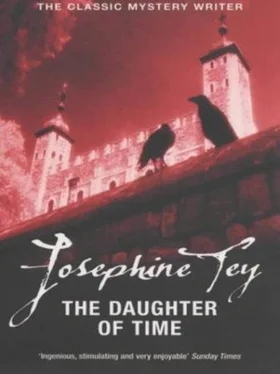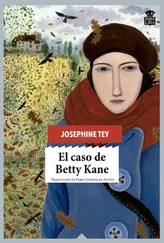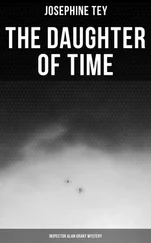Josephine Tey - The Daughter of Time
Здесь есть возможность читать онлайн «Josephine Tey - The Daughter of Time» весь текст электронной книги совершенно бесплатно (целиком полную версию без сокращений). В некоторых случаях можно слушать аудио, скачать через торрент в формате fb2 и присутствует краткое содержание. Год выпуска: 2010, Жанр: Классический детектив, на английском языке. Описание произведения, (предисловие) а так же отзывы посетителей доступны на портале библиотеки ЛибКат.
- Название:The Daughter of Time
- Автор:
- Жанр:
- Год:2010
- ISBN:нет данных
- Рейтинг книги:5 / 5. Голосов: 1
-
Избранное:Добавить в избранное
- Отзывы:
-
Ваша оценка:
- 100
- 1
- 2
- 3
- 4
- 5
The Daughter of Time: краткое содержание, описание и аннотация
Предлагаем к чтению аннотацию, описание, краткое содержание или предисловие (зависит от того, что написал сам автор книги «The Daughter of Time»). Если вы не нашли необходимую информацию о книге — напишите в комментариях, мы постараемся отыскать её.
The Daughter of Time — читать онлайн бесплатно полную книгу (весь текст) целиком
Ниже представлен текст книги, разбитый по страницам. Система сохранения места последней прочитанной страницы, позволяет с удобством читать онлайн бесплатно книгу «The Daughter of Time», без необходимости каждый раз заново искать на чём Вы остановились. Поставьте закладку, и сможете в любой момент перейти на страницу, на которой закончили чтение.
Интервал:
Закладка:
Had a stroke, probably, Grant considered. And little wonder. To have stood up and told that tale to a London crowd must have taken some nerve.
Sir Thomas’s account of the Princes in the Tower was the same as The Amazon’s, but Sir Thomas’s version was more detailed. Richard had suggested to Robert Brackenbury, Constable of the Tower, that it might be a good thing if the Princes disappeared, but Brackenbury would have no part in such an act. Richard therefore waited until he was at Warwick, during his progress through England after his coronation and then sent Tyrrel to London with orders that he was to receive the keys of the Tower for one night. During that night two ruffians, Dighton and Forrest, one a groom and one a warder, smothered the two boys.
At this point The Midget came in with his lunch and removed the book from his grasp; and while he forked the shepherd’s pie from plate to mouth he considered again the face of the man in the dock. The faithful and patient small brother who had turned into a monster.
When The Midget came back for his tray he said: ‘Did you know that Richard III was a very popular person in his day? Before he came to the throne, I mean.’
The Midget cast a baleful glance at the picture.
‘Always was a snake in the grass, if you ask me. Smooth, that’s what he was: smooth. Biding his time.’
Biding his time for what? he wondered, as she tapped away down the corridor. He could not have known that his brother Edward would die unexpectedly at the early age of forty. He could not have foreseen (even after a childhood shared with him in uncommon intimacy) that George’s on-goings would end in attainder and the debarring of his two children from the succession. There seemed little point in ‘biding one’s time’ if there was nothing to bide for. The indestructibly virtuous beauty with the gilt hair had, except for her incurable nepotism, proved an admirable Queen and had provided Edward with a large brood of healthy children, including two boys. The whole of that brood, together with George and his son and daughter, stood between Richard and the throne. It was surely unlikely that a man busy with the administration of the North of England, or campaigning (with dazzling success) against the Scots, would have much spare interest in being ‘smooth’.
What then had changed him so fundamentally in so short a time?
Grant reached for The Rose of Raby to see what Miss Payne-Ellis had had to say about the unhappy metamorphosis of Cecily Nevill’s youngest son. But that wily author had burked the issue. She had wanted the book to be a happy one, and to have carried it to its logical conclusion would have made it unredeemed tragedy. She had therefore wound it up with a fine resounding major chord by making her last chapter the coming-out of young Elizabeth, Edward’s eldest child. This avoided both the tragedy of Elizabeth’s young brothers and the defeat and death of Richard In battle.
So the book ended with a Palace party, and a flushed and happy young Elizabeth, very magnificent in a new white dress and her first pearls, dancing the soles out of her slippers like the princesses in the fairy-tale. Richard and Anne, and their delicate little son, had come up from Middleham for the occasion. But neither George nor Isabel was there. Isabel had died in childbirth years ago, obscurely and as far as George was concerned unmourned. George too had died obscurely, but with that perverseness that was so peculiarly George’s, had by that very obscurity won for himself imperishable fame.
George’s life had been a progression from one spectacular piece of spiritual extravagance to the next. Each time, his family must have said: Well, that at last is the summit of frightfulness; even George cannot think of anything more fantastic than that. And each time George had surprised them. There was no limit to George’s antic capacity.
The seed was perhaps sown when, during his first backsliding in the company of his father-in-law, Warwick had created him heir to the poor crazy puppet-King, Henry VI, whom Warwick had dumped back on the throne to spite his cousin Edward. Both Warwick’s hopes of seeing his daughter a Queen and George’s royal pretensions had gone down the drain on that night when Richard had gone over to the Lancastrian camp and talked to George. But the taste of importance had perhaps proved too much for a natural sweet-tooth. In the years to come the family were always heading George off from unexpected vagaries, or rescuing him from his latest caper.
When Isabel died he had been certain that she had been poisoned by her waiting-woman, and that his baby son had been poisoned by another. Edward, thinking the affair important enough to be tried before a London court, sent down a writ; only to find that George had tried them both at a petty sessions of his own magistrates and hanged them. The furious Edward, by way of rapping him over the knuckles, had two members of George’s household tried for treason; but instead of taking the hint George declared that this was just judicial murder, and went about saying so in loud tones and a fine blaze of lèse-majesté.
Then he decided that he wanted to marry the richest heiress in Europe; who was Margaret’s step-daughter, young Mary of Burgundy. Kind Margaret thought that it would be nice to have her brother in Burgundy, but Edward had arranged to back Maximilian of Austria’s suit, and George was a continual embarrassment.
When the Burgundy intrigue came to nothing, the family hoped for a little peace. After all, George owned half the Nevill lands and had no need to marry again either for fortune or children. But George had a new scheme for marrying Margaret, the sister of James III of Scotland.
At last his folie de grandeur graduated from secret negotiation undertaken on his own behalf with foreign courts to open display of the Lancastrian Act of Parliament which had declared him heir to the throne after Henry VI. This, inevitably, landed him before another Parliament, and a much less amenable one.
The trial was chiefly remarkable for a flaming and wordy row between the two brothers Edward and George, but when the expected attainder was passed, there was a pause. Depriving George of his standing was one thing: desirable and indeed necessary. But executing him was something else again.
As the days went by without sentence being carried out, the Commons sent a reminder. And next day it was announced that George, Duke of Clarence, had died in the Tower.
Drowned in a butt of Malmsey, said London. And what was merely a Cockney’s comment on a drunkard’s end passed into history and made the undeserving George immortal.
So George was not at that party at Westminster, and the emphasis in Miss Payne-Ellis’s final chapter was not Cecily Nevill as the mother of sons, but on Cecily Nevill the grandmother of a fine brood. George might have died discredited, on a dried-leaf heap of worn-out friendships, but his son, young Warwick, was a fine upstanding boy, and little Margaret at ten was already showing signs of the traditional Nevill beauty. Edmund, dead in battle at seventeen, might seem a wanton waste of young life, but there to balance it was the delicate baby whom she had never thought to rear; and he had a son to follow him. Richard In his twenties still looked as though one could break him in two, but he was as tough as a heather root, and perhaps his fragile-looking son would grow up to be as resilient. As for Edward, her tall blond Edward, his beauty might be blurring into grossness and his amiability into sloth, but his two small sons and his five girls had all the character and good looks of their combined ancestry.
As a grandmother she could look on that crowd of children with a personal pride, and as a Princess of England she could look on them with assurance. The crown was safe in the York line for generations to come.
Читать дальшеИнтервал:
Закладка:
Похожие книги на «The Daughter of Time»
Представляем Вашему вниманию похожие книги на «The Daughter of Time» списком для выбора. Мы отобрали схожую по названию и смыслу литературу в надежде предоставить читателям больше вариантов отыскать новые, интересные, ещё непрочитанные произведения.
Обсуждение, отзывы о книге «The Daughter of Time» и просто собственные мнения читателей. Оставьте ваши комментарии, напишите, что Вы думаете о произведении, его смысле или главных героях. Укажите что конкретно понравилось, а что нет, и почему Вы так считаете.












